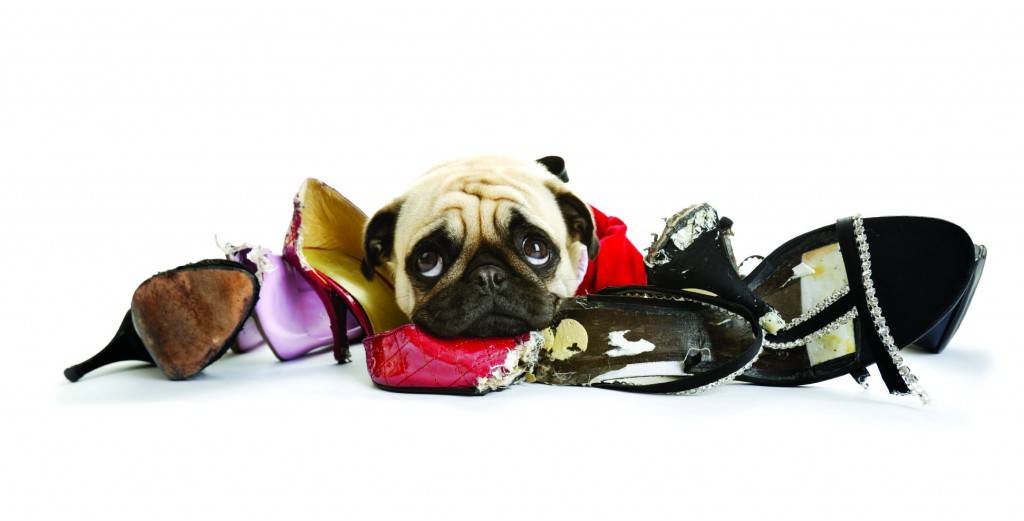Foreign body ingestion: what every pet owner needs to know

We are pleased to feature a guest blog post by Dr. Ingrid Pyka* who represents VPI® Pet Insurance, a trusted partner of Answer Financial. Last year, VPI paid more than $1 million in claims for foreign body ingestion. Don’t let your pet take a bite out of your budget. Call 1-866-838-7382 or click here to get a quote on pet insurance today—before you need it tomorrow.
By Dr. Ingrid Pyka
Like toddlers, pets have a tendency to chew anything they can get into their mouths. This becomes a serious and potentially life-threatening problem if the objects are swallowed. An animal ingesting a long string or ribbon can develop a linear foreign body, which is even more dangerous.
Where Do Foreign Bodies Get Stuck?
The digestive tract is essentially a long tube, passing food from the mouth, down the esophagus, into the stomach, through the lengthy small intestine, then forming stool in the colon and out the rectum.
It generally takes ingesta (all that is swallowed) from 10-24 hours to move through the entire digestive tract. Some objects, however, can actually remain in the stomach for longer periods of time, even months.
When objects are too large to pass, they usually obstruct at the stomach outflow or within the small intestine itself. With linear foreign bodies, the continual movement of the intestinal tract can literally bunch the intestines into an accordion-like mass.
If the foreign body has managed to move to the colon, it will probably pass successfully. But, defecating a sharp object may prove painful and may even need veterinary assistance. Never pull protruding objects from your pet’s rectum. If it is still lodged inside, you can cause serious damage to the internal tissues.
Symptoms of Foreign Body Ingestion
Animals with ingested foreign bodies generally do not feel well. They often stop eating and/or act depressed. In some cases, pets with intestinal foreign bodies may have diarrhea initially.
Most patients with digestive foreign bodies exhibit vomiting. If the object has not fully clogged the digestive tract, the vomiting may be intermittent. But with a complete blockage, the dog or cat will be unable to keep anything down, including liquids. The longer the blockage lasts, the more critical the animal’s condition becomes.
The Disastrous Cascade
If an intestinal obstruction has occurred, the dog or cat’s condition will decline. Repeated vomiting causes dehydration and electrolyte loss. This can severely weaken the patient.
The effect of the object on the gastrointestinal tract itself will also prove devastating to the body. The pressure of the foreign body against the intestinal wall together with the continued stretching or bunching of the intestines results in poor blood circulation to the tissues. This ultimately causes necrosis (dying off) of those tissues. In addition to being extremely painful, toxic enzymes release into the blood stream, initiating shock.
Eventually, the intestinal wall may break down and perforate (develop a hole). Once this occurs, the acidic and bacterial-contaminated intestinal contents leak into the abdomen. This results in peritonitis (infection of the abdominal space) and sepsis (infection of the bloodstream).
At this point, the patient is very critical. Without intensive intervention, this animal will die. With treatment, such patients can recover. Even with the best of efforts, however, some may not survive.
Keeping Your Pet Safe
Dogs and cats maintain no more than a toddler’s level of sense for their entire lives. Certainly some have a stronger tendency to swallow foreign objects, but all have the potential.
[unordered_list style=”tick”]
- Monitor your pet’s habits. Especially with puppies and kittens, keep small items picked up and out of their way. Discuss with your veterinarian appropriately sized chew toys, considering ALL the pets in your home.
- Examine all chew toys and stuffed animals you offer your pets for small pieces that may be chewed off and eaten. Monitor the toys for damage. Discard any smaller remnants. Never leave strings or ribbons within reach of your pets—especially cats.
- If you suspect that your pet has swallowed a foreign body, call your veterinarian immediately. If your pet exhibits signs of foreign body ingestion, your veterinarian will guide you in the best diagnostic approach at the time.
[/unordered_list]
The sooner your pet receives medical attention, the better his or her chances of full recovery with fewer complications.
Protect Your Pet Before an Emergency Strikes
Last year, VPI paid more than $1 million in claims for foreign body ingestion. Don’t let your pet take a bite out of your budget. Call 1-866-838-7382 to get a quote on pet insurance today—before you need it tomorrow.
*This special guest blog post is an authorized adaptation of Dr. Ingrid Pyka’s article “Foreign body Ingestion Threatens Pets” on the VPI Pet Insurance Blog.
October 26, 2012
Thank you!